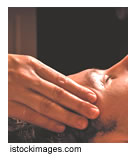by Rev. John E. Schroeder
 As a Veterans Administration hospital chaplain from age 50 to 65, I grew in great respect for all working there, from diagnosticians to surgeons, from nurses and social workers to those in sanitation and maintenance. They did their best. So did I, but not always with the knowledge I should have had. God blesses preachers most!
As a Veterans Administration hospital chaplain from age 50 to 65, I grew in great respect for all working there, from diagnosticians to surgeons, from nurses and social workers to those in sanitation and maintenance. They did their best. So did I, but not always with the knowledge I should have had. God blesses preachers most!
I generally arrived at my basement office at 7:30 a.m. to assign other chaplains new patient cards before they arrived at eight. On a memorable Monday morning, Caroline—a staff secretary from another division—confronted me before I could unlock my door.
“Mr. Smith is going into surgery right now!”
“No one is scheduled on the surgical chart this morning.”
She pointed her finger toward the elevator door and shouted, “Run!”
I knew Caroline’s reputation from her volunteer work as the organizer of the hospital’s daily lunchtime “Fasting Prayer Session.” I ran. Breathless, I took the elevator up to the fourth floor and ran to the surgical suite.
“Mr. Smith?” I gasped.
A nurse pointed to a gurney being wheeled toward swinging doors. “Whatever you do, do fast!”
“I don’t know what’s wrong with him,” I thought as I caught up with the gurney and put my right hand on Mr. Smith’s forehead.
“Lord, make this the shortest operation of its kind on record, and give him a complete healing. Amen.” Mr. Smith was wheeled through the doors.
Immediately, I had second thoughts. “Why did I say a dumb prayer like that? Even in an emergency like this, God deserved a more sensible request.” With a heavy sigh, I returned to my office and assigned the other chaplains patients based on the new admission cards on my desk. God gave me a good day but no report on Mr. Smith’s emergency surgery.
When I arrived the next morning, the chief surgeon was standing by my office door, arms crossed in front of his chest. From a lecture by Tennessee Williams on the significance of body language I once attended, I knew that pose meant “stubborn obstinance.”
The surgeon’s first words were even more powerful than his stance. “What did you do to Mr. Smith before surgery yesterday?” he demanded.
I invited him into my office. I wanted to ensure privacy while he chewed me out.
As expected, he began loudly, “I’m a surgeon—a scientist who acts logically on all the data I receive. Mr. Smith came in as an outpatient on Wednesday, complaining of abdominal pain. The intern who examined him discovered a large abdominal mass. I ordered x-rays and determined that Mr. Smith had a suspicious tumor. I ordered a needle biopsy and the return data—aggressive, fast-moving cancer—demanded the earliest surgery possible, which was yesterday morning.”
He continued: “I had the intern’s report, the x-rays, and the needle biopsy. After you did whatever you did, I ordered an MRI to determine exactly where I would not cut. I’m a scientist. I act logically on all the evidence I have. When I opened him up, I found nothing. Absolutely nothing! What did you do?”
My reply was simply and honest. “I did nothing. God did everything. He answered the one-sentence prayer I gave out of my ignorance of the patient’s condition.”
“Well, I have to thank you for your prayer and thank God for His gracious answer,” the surgeon replied.
We shared a short prayer of thanks, shook hands, and the surgeon left. The next time I saw him was at one of Caroline’s “Fasting Prayer Sessions.” We both knew that prayers, no matter how simple or inarticulate, are heard by our heavenly Father.


